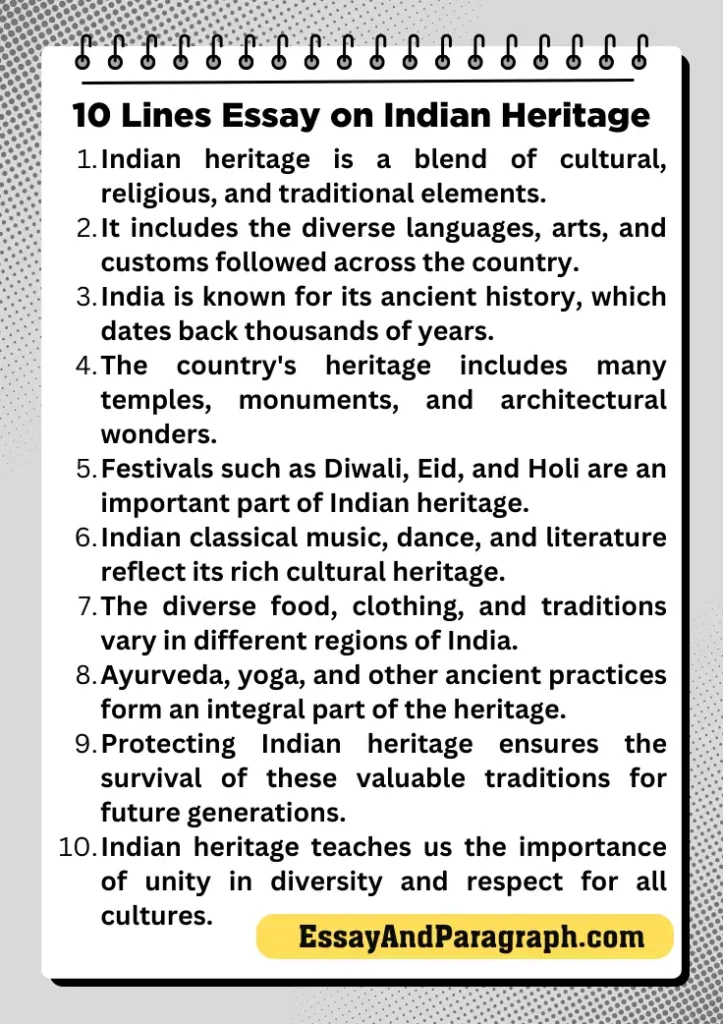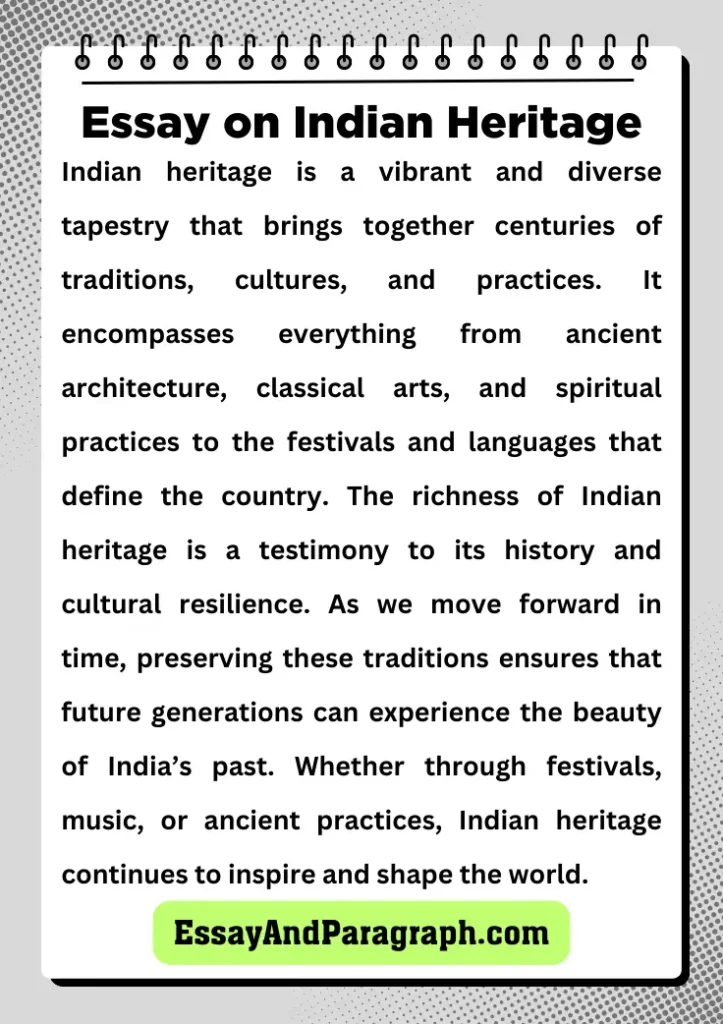Ever heard of the term “Indian Heritage”? It’s a beautiful tapestry woven with rich traditions, vibrant cultures, and remarkable history. Indian heritage is the legacy passed down through generations, representing the values, customs, arts, and practices that shape the country. India, with its diverse languages, religions, and festivals, has one of the world’s oldest and most unique heritages. In this article, we will learn how to write an essay on Indian Heritage and explore its importance in our lives.
10 Lines Essay on Indian Heritage
Indian heritage is a blend of cultural, religious, and traditional elements.
It includes the diverse languages, arts, and customs followed across the country.
India is known for its ancient history, which dates back thousands of years.
The country’s heritage includes many temples, monuments, and architectural wonders.
Festivals such as Diwali, Eid, and Holi are an important part of Indian heritage.
Indian classical music, dance, and literature reflect its rich cultural heritage.
The diverse food, clothing, and traditions vary in different regions of India.
Ayurveda, yoga, and other ancient practices form an integral part of the heritage.
Protecting Indian heritage ensures the survival of these valuable traditions for future generations.
Indian heritage teaches us the importance of unity in diversity and respect for all cultures.

Short Essay on Indian Heritage – 100 words
Indian heritage is a collection of traditions, customs, and practices passed down through generations. It encompasses everything from festivals like Diwali and Holi to classical dance forms and music. The rich diversity of India is reflected in its culture, which celebrates unity in diversity. Architecture like the Taj Mahal, along with ancient practices like yoga and Ayurveda, are part of India’s timeless legacy. Preserving this heritage is crucial for understanding India’s roots and appreciating its significance in the modern world. Indian heritage teaches us the value of tradition and cultural pride.
Short Essay on Indian Heritage – 150 Words
Indian heritage is a vibrant mix of history, culture, traditions, and values. It dates back thousands of years, starting with the Indus Valley Civilization. Over time, India has nurtured diverse religions such as Hinduism, Buddhism, Jainism, and Sikhism, each contributing to the cultural richness. Indian festivals, such as Diwali and Holi, reflect the country’s deep-rooted traditions and offer a chance to celebrate with family and friends. Indian heritage also shines through in its art, music, and dance, from classical forms like Bharatanatyam to beautiful handicrafts and intricate architecture like the Taj Mahal. The diverse languages spoken across the country add to the beauty of India’s cultural heritage. Whether it’s traditional clothing like saris or the unique flavors of Indian cuisine, heritage remains the heart of India. Understanding and preserving this rich legacy ensures that future generations appreciate their cultural roots and continue to pass on these valuable traditions.
Essay on Indian Heritage – 200 Words
Indian heritage is an essential part of the country’s identity, encompassing its traditions, cultures, history, and values. It is built upon thousands of years of history, dating back to the ancient Indus Valley Civilization. India has always been a land of diversity, and its heritage reflects this, with different religions, languages, and customs that have shaped its society. Hinduism, Buddhism, Jainism, and Sikhism are the major religions that originated in India and have had a profound influence on the country’s culture and philosophy.
Festivals like Diwali, Holi, Eid, and Christmas bring people together, highlighting India’s cultural and religious diversity. Indian art and architecture, such as the Taj Mahal and ancient temples, are globally recognized for their beauty and historical significance. Traditional music, dance, and craftsmanship also contribute to India’s cultural wealth. The country’s diverse languages and regional dialects are a testament to its multifaceted culture. India’s culinary heritage, with its wide range of spices and dishes, has influenced the world over. Preserving Indian heritage is crucial to maintaining the unity and continuity of its culture. By honoring and understanding these traditions, future generations will continue to cherish and celebrate India’s diverse heritage.
Short Essay on Indian Heritage – 250 Words
Long Essay on Indian Heritage – 500 words
Indian heritage is an intricate mosaic of traditions, practices, art forms, and beliefs that have been passed down through generations. It is a unique blend of ancient cultures and modern-day advancements, reflecting the depth and richness of India’s history. From the moment you step foot in India, you can feel the weight of its heritage in every street, every temple, and every tradition.
The heritage of India can be divided into several aspects, such as cultural, religious, architectural, and even spiritual. The diverse languages spoken across the country, such as Hindi, Bengali, Tamil, and many more, are part of its cultural diversity. This diversity is also seen in the various religions practiced, including Hinduism, Islam, Christianity, Sikhism, and Buddhism, each with its own festivals and rituals.
One of the most prominent elements of Indian heritage is its ancient art and architecture. The temples of Khajuraho, the ruins of Hampi, and the grand Taj Mahal are just a few examples of India’s architectural excellence. These monuments not only reflect the artistic prowess of ancient Indians but also tell stories of India’s glorious past.
Music and dance are vital components of Indian heritage. Classical dance forms like Bharatanatyam, Kathak, and Odissi have been performed for centuries and are a reflection of India’s cultural richness. Indian classical music, both vocal and instrumental, carries centuries of history in its ragas and talas.
Additionally, the spiritual and philosophical teachings of India, such as yoga and Ayurveda, have been practiced for thousands of years and continue to impact the world today. Yoga, which originated in India, is now a global practice for physical and mental well-being. Ayurveda, an ancient system of medicine, is still followed by many who believe in natural healing.
The festivals celebrated across India are a testament to its rich cultural heritage. Diwali, the festival of lights, Holi, the festival of colors, Eid, Christmas, and many other festivals are celebrated with great enthusiasm and joy. These festivals bring people together, transcending religious and cultural barriers.
Preserving India’s heritage is essential for future generations. In today’s fast-paced world, where modernity often overshadows tradition, it is crucial to remind ourselves of the value of our roots. By protecting and celebrating Indian heritage, we ensure that the legacy of our ancestors continues to inspire and teach future generations.
FAQs on Essay on Indian Heritage
1. What is the significance of Indian heritage?
Indian heritage represents the cultural, spiritual, and historical essence of India. It includes traditional practices, art, architecture, languages, and customs that have been passed down through generations. The significance lies in maintaining cultural continuity, fostering unity in diversity, and helping people understand and appreciate the country’s rich past.
2. How does Indian heritage influence modern India?
Indian heritage continues to influence modern India in numerous ways. From architecture and art to language and festivals, the traditional customs shape India’s identity. Even in contemporary society, practices like yoga, Ayurveda, and the celebration of traditional festivals are an integral part of life for millions of people in India and around the world.
3. What are some examples of Indian heritage?
Examples of Indian heritage include monumental structures like the Taj Mahal, ancient temples, traditional Indian art forms like Kathakali and Bharatanatyam, the practice of yoga, the system of Ayurveda, and the diverse festivals celebrated across India. The food, clothing, and crafts also reflect the country’s heritage.
4. Why is it important to preserve Indian heritage?
Preserving Indian heritage helps maintain the cultural identity and historical significance of the country. It ensures that future generations understand their roots and heritage. Protection of heritage sites and practices allows for the continuation of rich traditions, customs, and values that are integral to the nation’s spirit.
5. What role do festivals play in Indian heritage?
Festivals are an important part of Indian heritage. They bring people together, promote unity in diversity, and celebrate India’s cultural richness. Festivals like Diwali, Eid, and Durga Puja not only hold religious significance but also reinforce social bonds and cultural traditions.
6. How can we protect and promote Indian heritage?
Protecting Indian heritage requires preserving cultural traditions, safeguarding historical monuments, and promoting awareness about the importance of heritage. It also involves educating younger generations about their history and encouraging them to value and celebrate their cultural identity.
Top 5 Quotes on Indian Heritage
“India’s heritage is the backbone of its future, filled with wisdom that has stood the test of time.”
“Heritage is not something we inherit from our ancestors; it is something we borrow from our children.”
“The essence of India lies in its diversity, and its heritage is a celebration of this very diversity.”
“To understand the future, one must first understand the past, and India’s heritage holds the key.”
“Indian heritage is not just about monuments, it’s about the living traditions that define us.”

Summary on Indian Heritage
Indian heritage is a vibrant and diverse tapestry that brings together centuries of traditions, cultures, and practices. It encompasses everything from ancient architecture, classical arts, and spiritual practices to the festivals and languages that define the country. The richness of Indian heritage is a testimony to its history and cultural resilience. As we move forward in time, preserving these traditions ensures that future generations can experience the beauty of India’s past. Whether through festivals, music, or ancient practices, Indian heritage continues to inspire and shape the world.



